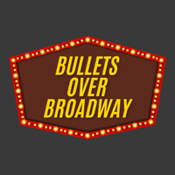
Overview
Synopsis
Welcome to the 1920s and prohibition-era New York!
Written by Woody Allen and based on his 1994 film of the same name, Bullets Over Broadway tells the story of David Shane, an aspiring young playwright who is determined to find a backer to produce his show on Broadway. He soon meets Nick Valenti, a man with the cash David needs. However, there is one catch. Valenti is one of New York’s most influential mobsters and he is determined that David's new play will be a vehicle for his ditzy and talentless girlfriend, Olive. Against a mural of dancing chorus girls, Valenti appoints Cheech as Olive’s bodyguard while she rehearses for the show. However, things take a turn when Cheech discovers a talent for script-writing, Olive catches the eye of male lead, Warner Purcell, and David finds himself falling for his leading lady.
Featuring a string of popular 1920s tunes, including "Let's Misbehave," "'T'ain't Nobody's Biz-ness If I Do" and "There's a New Day Comin'!", Bullets Over Broadway is a jazzy romp of a show!
Show Information
Context
Plot
Characters
| Name | Part Size | Gender | Vocal Part |
|---|---|---|---|
|
Lead |
Male |
Baritone, Tenor |
|
|
Lead |
Female |
Soprano |
|
|
Supporting |
Male |
Baritone |
|
|
Supporting |
Male |
Baritone |
|
|
Supporting |
Female |
Soprano |
|
|
Supporting |
Female |
Alto |
|
|
Supporting |
Male |
Baritone |
|
|
Featured |
Male |
Tenor |
|
|
Featured |
Female |
Alto, Mezzo-Soprano |
|
|
Ensemble |
Either Gender |
Soprano, Mezzo-Soprano, Alto, Tenor, Baritone, Bass |
Songs
Act One
- “Tiger Rag” - The Atta-Girls, Olive, Nick, Cheech and Gangsters
- “Gee, Baby, Ain't I Good to You” - Nick and Olive
- “Blues My Naughty Sweetie Gives to Me” - Ellen and David
- “Tain't a Fit Night Out for Man or Beast” - Valenti Gang, Kustabeck Gang and Flappers
- “The Hot Dog Song” - Olive
- ‘Gee Baby, Ain't I Good to You (Reprise)” - Nick
- “They Go Wild, Simply Wild, Over Me” - Helen and Julian
- “Up a Lazy River” - Cheech
- “I'm Sitting on Top of the World” - David
- “Let's Misbehave” - Warner and Olive
- “There's a Broken Heart for Every Light on Broadway” - Helen and David
- “(I'll Be Glad When You're Dead) You Rascal You” - The Atta-Girls
- “Tain't Nobody's Biz-ness If I Do” - Cheech and Gangsters
- “Runnin' Wild” - Full Company
Act Two
- “There's a New Day Comin'!” - Eden and Company
- “There'll Be Some Changes Made” - Cheech, Warner and Gangsters
- “I Ain't Gonna Play No Second Fiddle” - Helen and David
- “Good Old New York” - The Red Caps
- “Up a Lazy River (Reprise)” - Cheech
- “I've Found a New Baby”- Ellen and David
- “The Panic Is On” - David
- “Tain't Nobody's Biz-ness If I Do (Reprise)” - Cheech
- “Runnin' Wild (Reprise)” - Company
- “Up a Lazy River (Reprise)” - Cheech
- “She's Funny That Way” - David and Ellen
- “Finale (Yes, We Have no Bananas)” - Full Company
A song with an asterisk (*) before the title indicates a dance number; a character listed in a song with an asterisk (*) by the character's name indicates that the character exclusively serves as a dancer in this song, which is sung by other characters.
Monologues
Scenes
Key Terms
An adaptation is a reworking of a story from one medium or cultural context into another, such as turning a novel into a play or updating a classic play’s setting. Adaptations often reinterpret themes, characters, and style for new audiences. They can range from faithful recreations to bold reimaginings.
A musical genre characterized by syncopation and improvisation, frequently integrated into musical theatre for style and rhythm.
A jukebox musical is a type of musical where the score is made up of pre-existing, well-known popular songs instead of original music.
A historical U.S. period (1920–1933) banning alcohol, often depicted in theatre through speakeasies, crime, and rebellion.
A production created to showcase the talents of a specific star performer, often tailored to their strengths.
Videos
Quizzes
Themes, Symbols & Motifs
Sorry! We do not currently have learning modules for this guide.
Quote Analysis
Sorry! We do not currently have learning modules for this guide.
